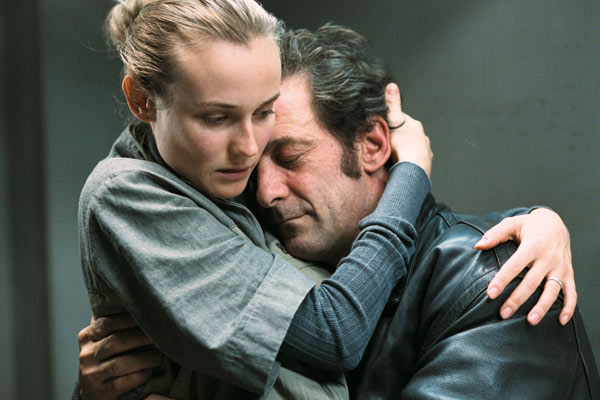Cast: Gael García Bernal, Diego Luna, Guillermo Francella, Jessica Mas
Tonight I was invited by The Script Factory to attend a special screening of ‘Rudo y Cursi’, followed by a Q&A with the film’s makers. ‘Rudo y Cursi’ is the directoral debut of ‘Y tu mamá también’ scribe Carlos Cuaron. It is also the first first film to be unveiled by the new Mexican production powerhouse, Cha Cha Cha Films.
It’s a new company but the names of the three founders might ring some bells somewhere in the deep recesses of your mind: Guillermo del Toro, Alfonso Cuarón, and Alejandro González Iñárittu! The film also happens to star the two most iconic faces of the Mexican New Wave, Gael García Bernal and Diego Luna.
There is no equivalent to this film anywhere in the canons of cinema. It is the Mexican equivalent of Coppolla, Peckinpah, and Scorcese teaming up to produce the directorial debut of Robert Towne, starring De Niro and Nicholson. Or Christopher Nolan, Gus Van Sant and David O. Russel teaming up to produce… well you get the picture.
So what sort of film has the triptych of Mexican cinema chosen as a calling card for their new company? Is it a searing urban drama with a fractured narrative? A CGI epic with a historical twist? A buddy/ road movie with a dark heart? Or a Dickens adaptation? (hands up those who forgot Alfonso Cuaron’s modern retelling of Great Expectations!)
The answer is a merger between a few of these things, but with a result that bears no resemblance to any of them. This is a film that is surprisingly rudo (rough) but also unashamedly cursi (corny); and within this mutually beneficial dialectic can be found the unique, inexplicable beauty of Mexican cinema in its modern guise.
It is a film that shares the sweaty, energetic aesthetic of ‘Amores Perros’ and ‘Y tu mamá también’; but it also has a humour and free-flowing ease that allows it to float away from the filmography of it’s creators and waft across the screen in waves of laughter.
Carlos Cuaron conceived the idea of a football mockumentary, and announced it to Bernal and Luna, during a publicity tour for ‘Y tu mamá también’; but when both actors expressed a desire to play the part of the footballing buffoon destined for fame and humiliation, Cuaron was forced to write in a brother (which character is the brother is a point of endless contention between the jibing stars who are lifelong friends).
The result is a story in which to awkwardly-placed brothers are forced to jostle with each other for the attention of their football scout, their mother, and the affection of the nation. Beto (Luna) is nicknamed Rudo because of his ruthless style of goalkeeping; Tato (Bernal) is given his nickname Cursi because of his shamelessly cheesy attempts at achieving pop star fame with a rendition of Cheap Trick’s ‘I want you to want me”.
The film follows the brothers from their humble banana plantation to the ‘monster’ of Mexico City. As they both achieve fame for their football talent, they both fall into the traditional trappings of excess: egotism, socialite girlfriends, spending sprees, and gambling addictions. The film leads towards the traditional ‘big game’, but not in a way that you would expect of a normal sports film.
In fact, nothing in this film fits within the genre of ‘sports film’, or any other genre for that matter. It is the rags to riches, and then back to rags, story of two football players and yet there are approximately ten seconds of football footage in the entire film. It is a film about so many of Mexico’s social ills (corruption, the drug trade, the irresponsible treatment of young sportsmen) and yet it only glances at these problems with the inquisitive eye of a satirist. It is a modern comedy and yet it owes so much of its visual and situational humour to Hollywood’s Screwball years.
Del Toro called the film a “sheep in wolves clothing”, and that has proved to be the case. Just listening to the Cuaron brothers and the two stars talking on stage, it was so clear that they had an enormous amount of fun making this film. And yet the film has had just as enormous an effect on Mexican society as any of their previous films that were made with social criticism much closer to the forefront of their minds. Politicians in Mexico have been using Tato’s embarrassing Pop song in campaigns (some to gain support, others to humiliate rivals) and the very phrase ‘rudo y cursi’ has entered the Mexican lexicon (I have always wanted to combine those words) and spread far beyond the world of film.
The modest and quietly spoken Alfonso Cuaron was humble in his assessment of the way Mexican cinema has changed since his arrival on the world stage. He pointed out the irrelevance of a ‘film’ industry in a country that desperately needs to support so many other industries that are truly necessary. But where he seemed truly optimistic and burning with pride was when he spoke of the space that Mexican cinema has demanded for itself on the crowded and unfairly distributed ‘world cinema’stage. Cuaron and his band of brothers have taken the world by storm before; I have no doubt that they will do it again, and eventually go down as one of the most important and determined movements in film history.
Tonight I was invited by The Script Factory to attend a special screening of ‘Rudo y Cursi’, followed by a Q&A with the film’s makers. ‘Rudo y Cursi’ is the directoral debut of ‘Y tu mamá también’ scribe Carlos Cuaron. It is also the first first film to be unveiled by the new Mexican production powerhouse, Cha Cha Cha Films.
It’s a new company but the names of the three founders might ring some bells somewhere in the deep recesses of your mind: Guillermo del Toro, Alfonso Cuarón, and Alejandro González Iñárittu! The film also happens to star the two most iconic faces of the Mexican New Wave, Gael García Bernal and Diego Luna.
There is no equivalent to this film anywhere in the canons of cinema. It is the Mexican equivalent of Coppolla, Peckinpah, and Scorcese teaming up to produce the directorial debut of Robert Towne, starring De Niro and Nicholson. Or Christopher Nolan, Gus Van Sant and David O. Russel teaming up to produce… well you get the picture.
So what sort of film has the triptych of Mexican cinema chosen as a calling card for their new company? Is it a searing urban drama with a fractured narrative? A CGI epic with a historical twist? A buddy/ road movie with a dark heart? Or a Dickens adaptation? (hands up those who forgot Alfonso Cuaron’s modern retelling of Great Expectations!)
The answer is a merger between a few of these things, but with a result that bears no resemblance to any of them. This is a film that is surprisingly rudo (rough) but also unashamedly cursi (corny); and within this mutually beneficial dialectic can be found the unique, inexplicable beauty of Mexican cinema in its modern guise.
It is a film that shares the sweaty, energetic aesthetic of ‘Amores Perros’ and ‘Y tu mamá también’; but it also has a humour and free-flowing ease that allows it to float away from the filmography of it’s creators and waft across the screen in waves of laughter.
Carlos Cuaron conceived the idea of a football mockumentary, and announced it to Bernal and Luna, during a publicity tour for ‘Y tu mamá también’; but when both actors expressed a desire to play the part of the footballing buffoon destined for fame and humiliation, Cuaron was forced to write in a brother (which character is the brother is a point of endless contention between the jibing stars who are lifelong friends).
The result is a story in which to awkwardly-placed brothers are forced to jostle with each other for the attention of their football scout, their mother, and the affection of the nation. Beto (Luna) is nicknamed Rudo because of his ruthless style of goalkeeping; Tato (Bernal) is given his nickname Cursi because of his shamelessly cheesy attempts at achieving pop star fame with a rendition of Cheap Trick’s ‘I want you to want me”.
The film follows the brothers from their humble banana plantation to the ‘monster’ of Mexico City. As they both achieve fame for their football talent, they both fall into the traditional trappings of excess: egotism, socialite girlfriends, spending sprees, and gambling addictions. The film leads towards the traditional ‘big game’, but not in a way that you would expect of a normal sports film.
In fact, nothing in this film fits within the genre of ‘sports film’, or any other genre for that matter. It is the rags to riches, and then back to rags, story of two football players and yet there are approximately ten seconds of football footage in the entire film. It is a film about so many of Mexico’s social ills (corruption, the drug trade, the irresponsible treatment of young sportsmen) and yet it only glances at these problems with the inquisitive eye of a satirist. It is a modern comedy and yet it owes so much of its visual and situational humour to Hollywood’s Screwball years.
Del Toro called the film a “sheep in wolves clothing”, and that has proved to be the case. Just listening to the Cuaron brothers and the two stars talking on stage, it was so clear that they had an enormous amount of fun making this film. And yet the film has had just as enormous an effect on Mexican society as any of their previous films that were made with social criticism much closer to the forefront of their minds. Politicians in Mexico have been using Tato’s embarrassing Pop song in campaigns (some to gain support, others to humiliate rivals) and the very phrase ‘rudo y cursi’ has entered the Mexican lexicon (I have always wanted to combine those words) and spread far beyond the world of film.
The modest and quietly spoken Alfonso Cuaron was humble in his assessment of the way Mexican cinema has changed since his arrival on the world stage. He pointed out the irrelevance of a ‘film’ industry in a country that desperately needs to support so many other industries that are truly necessary. But where he seemed truly optimistic and burning with pride was when he spoke of the space that Mexican cinema has demanded for itself on the crowded and unfairly distributed ‘world cinema’stage. Cuaron and his band of brothers have taken the world by storm before; I have no doubt that they will do it again, and eventually go down as one of the most important and determined movements in film history.









